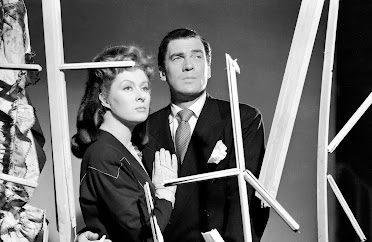US 133m Dir: William Wyler Key Cast: Greer Garson
Based on Mrs. Miniver by Jan Struther (Collected Newspaper Columns)
It's fascinating to watch how films made during the Second World War depicted it. It most examples the tragic influence of the war on people's lives is highlighted but the actual horrors of war are usually seen off screen. This approach seemed to work because many of these films, including Mrs. Miniver were hugely popular and uplifting, whilst serving as propaganda at the same time. Indeed, even Joseph Goebbels recognised how strong this film is as propaganda and there's a man who would have known.
The film opens with the Miniver family living a happy life in the idyllic English countryside. Personally I found the first act to be rather dull as very little actually happens and the film tries to paint some almost Utopian version of England that has clearly never actually existed.
Things get more interested when war is declared and we see just how universally it affects the family. Oldest son Vin joins the RAF and there's constant fear from all the over characters that he will be killed in action. Father Clem is involved in the evacuation of Dunkirk and becomes an ARP Warden. Air raids happen frequently and the Miniver family hide out in their shelter as the bombs fall.
All of the actual horror of war is off screen. We see Clem leave for Dunkirk and return but he doesn't even want to talk about it. The air raids happen outside the shelter whilst we are safe inside with the characters. At one point a German pilot hides in the family garden and mother Kay is faced with him at gunpoint. It's a pretty unlikely scenario but it works really well as a representation of the enemy. This pilot is a pretty horrible man who aggressively says that the Third Reich will win. There's no nuance in the character but there doesn't need to be- he is Nazi Germany summed in one average man.
The film does approach darker territory at it's climax when one of the characters is killed, though even then it's done in as un-traumatic a way as possible. It's actually quite clever plot-wise because it's not the character you would expect to die. It leads into the superb final moments of the film when the local vicar gives what is surely one of cinema's greatest speeches.
The whole film is really about the British attitude of "keep calm and carry on" and it's something many Brits are still very proud of. It's hard to know how accurate this attitude actually was though having lived through the height of the Covid pandemic it certainly feels like it's the way we deal with a crisis.
As a film I think it's overly sentimental but even now there's something uplifting about it. The sacrifices of the home front are really effectively displayed here, not shown in a way to utterly depress viewers yet highlighting how tough things were and the fact that the country, and indeed the world, could get through this.

Comments
Post a Comment